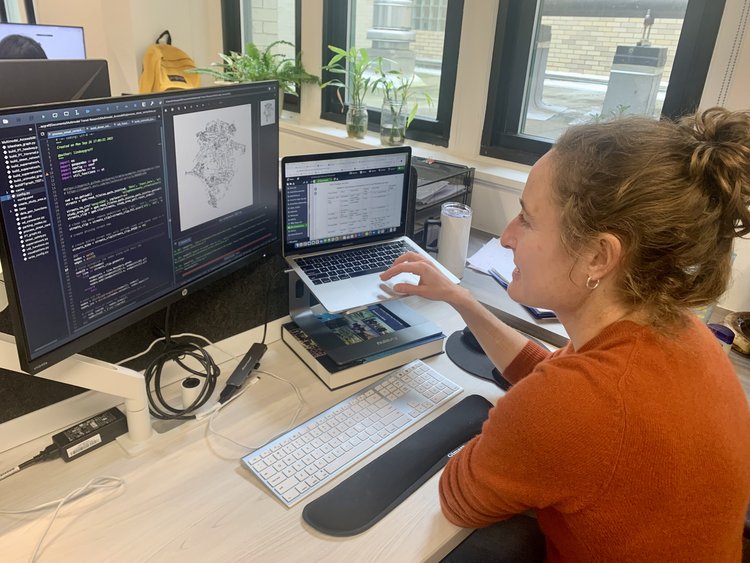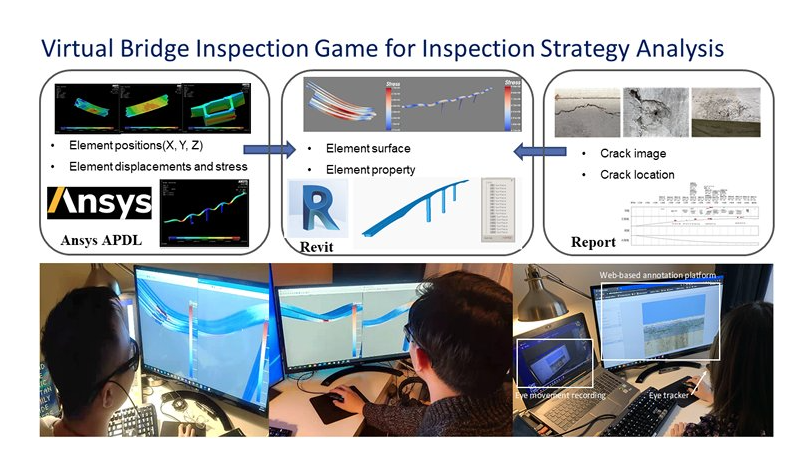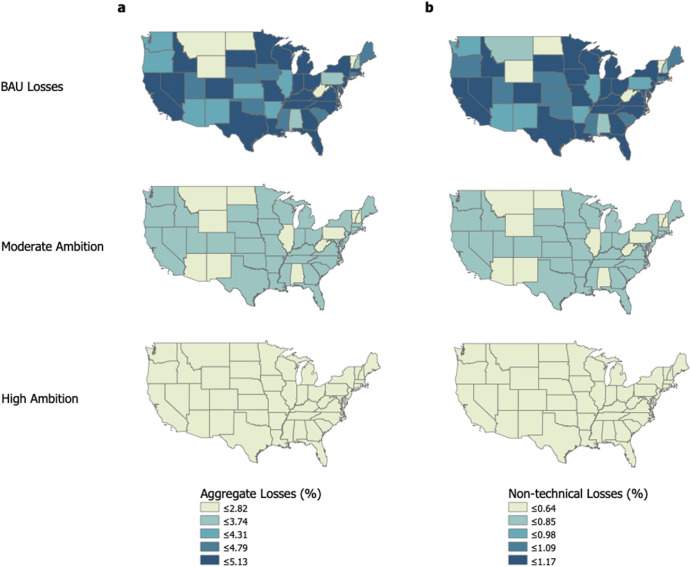SETS Example Projects
Here are a few projects currently in progress within the Sustainable Energy and Transportation Systems (SETS) research group.
A Digital Twin Virtual Testbed for Sustainable and Equitable Autonomous Food Delivery
Autonomous delivery technologies (e.g., drones, sidewalk delivery robots, and trucks) are advancing rapidly and hold real promise for improving access to quality fresh foods. Amid the enthusiasm around what these vehicles could mean for the future of transportation and circulation of essential goods, there are also concerns about how to implement these delivery modes sustainably and the distribution of benefits and costs from these technologies across different communities and neighborhoods.
The goal of this project is to collaboratively develop an integrated digital twin virtual test bed that simulates food delivery using a mix of truck, sidewalk robot delivery, and aerial drone vehicles. State and local agencies can use the testbed for setting policies such as equitable sidewalk right-of-way allocation, pricing, and safety regulation. Food delivery services can also use the testbed to assess how different good distribution models affect delivery cost, fresh food access, energy use, emissions, and profitability within different neighborhoods.
Faculty: Corey Harper

Optimizing Mobility Subsidies and Infrastructure in Multimodal Transportation Networks
The sharing economy has revolutionized the way that people travel in urban areas. Residents without a personal vehicle can now take advantage of shared bikes, e-scooters, and transportation network company vehicles (e.g., Uber, Lyft) to reach jobs, grocery stores, and healthcare facilities.
However, mobility infrastructure is not always fairly distributed across neighborhoods due to biases in the formulation of network design problems; these design problems often aim to maximize cost efficiency, which skews results in favor of larger population centers without regard to underserved areas. Building upon a routable and flexible multimodal network computational model developed by the team, this work addresses this spatial bias by optimizing the allocation of monetary mobility subsidies across communities and mobility infrastructure investments that equitably provide access to essential goods and services.
Faculty: Katherine Flanigan and Sean Qian

Disaster Recovery and Response Innovation through Fuel Cell Deployment
This Disaster Resilience Research Grants (DRRG) project addresses the need to enhance community resilience to electricity power outages caused by natural disasters like wildfires and hurricanes exacerbated by climate change. Unlike traditional approaches such as rooftop solar or diesel generators, the project explores the potential of modular micro-grids using advanced technologies like solid-oxide fuel cells. These micro-grids aim to provide reliable electrical power during disaster response and humanitarian relief efforts, particularly benefiting low-income populations.
The research combines economic analysis, electricity planning, and operations research to assess the effectiveness of decentralized infrastructure in reducing outage time and improving disaster response. It also considers cost, resilience, and equity objectives in its evaluation. Ultimately, this work aims to enable communities to maintain essential services, support healthcare responders, and reduce the impact of power outages in disaster-stricken areas.
Faculty: Destenie Nock

Probabilistic Network Flow Theory: Embracing Emerging Big Data for Efficient, Reliable and Sustainable Multi-model Transportation Systems
The goal of this project is to establish a mathematical framework for transportation system modeling, leveraging large-scale multi-source data from various transportation systems like roads, public transit, and parking. The objective is to analyze the spatio-temporal travel demand patterns, understand how network disruptions affect transportation systems probabilistically, and support decision-making in planning and real-time operations.
The project involves collaborating with public agencies and private firms in Pittsburgh, using large-scale data analytics to develop real-world systems. All models and algorithms will be open-sourced for global access. Additionally, the project includes educational and outreach components, ultimately advancing data-driven transportation science.
Faculty: Sean Qian

Predictive Real-Time Traffic Management in Large-Scale Networks Using Model-Based Artificial Intelligence
This research project tackles the real-time challenges of operating transportation highway networks. It addresses planned and unplanned incidents that can severely impact mobility and safety, such as accidents and hazardous weather conditions. Traffic operators lack effective strategies for mitigating these non-recurrent impacts and struggle to manage the increasing volume of traffic data.
The project develops AI-guided theories, models, and algorithms based on transportation network flow models to achieve two primary goals. Firstly, it seeks to predict non-recurrent traffic conditions in large-scale networks at least 30 minutes ahead. Secondly, it aims to proactively recommend real-time operational management strategies.
These prediction and operational strategies are closely intertwined, with machine learning considering historical traffic data and current operational strategies. The research will involve case studies in a small municipality network and two large-scale regional networks to validate the AI-driven approach for highway network management.
Faculty: Sean Qian

Equity and Sustainability: A Framework for Equitable Energy Transition Analyses
This research examines the transition from fossil fuels to renewable energy in the US electricity sector, considering social equity and sustainability. It addresses two key questions: balancing conflicting objectives during the transition and minimizing adverse impacts on vulnerable groups.
The study extends previous research in three ways: integrating sustainability and electricity system models, assessing regional cooperation's importance in decarbonization, and incorporating social equity into the analysis. It aims to offer a comprehensive sustainability assessment for the entire US electricity system, including various social equity metrics and intermittent renewables integration.
Additionally, the project will develop an open-source tool for electricity sustainability analysis to facilitate national discussions and support job recovery planning in areas affected by fossil fuel generation retirement.
Faculty: Destenie Nock

Developing an Equity-Focused Planning Tool for Transit and Bike Share Systems
Lack of reliable and efficient transportation is often cited as a pivotal barrier to healthcare and employment access. Many people without regular access to automobiles depend on public transit as their main mode of transportation. In densely populated neighborhoods, a fixed route system may work well. Still, in medium or low-density areas where residents may have to travel longer distances to and from transit stops, the lack of accessibility creates tremendous challenges for human mobility. It leads to the usage of unsustainable transportation modes.
Bike share systems (e.g., POGOH) are becoming an increasingly popular feature of many urban areas across the United States. They could improve transportation access by establishing new transit connections but suffer from low-density and inequitable distribution of services, typically in low-income areas. Equity-focused planning tools could address this shortcoming by making bike-share providers more aware of how bike-share station siting decisions impact transportation access and mobility for underserved populations.
The goals of this project are to build a replicable, open, deployable model that: 1) produces a quantifiable system-wide measure of equity performance for transit and bike share systems and 2) incorporates this equity metric as well as stakeholder preferences towards equality (e.g., low or high), other planning metrics (e.g., network and transit connectivity), and budget constraints (e.g. number of bikes) into a multi-criteria decision analysis (MCDA).
Faculty: Corey Harper
